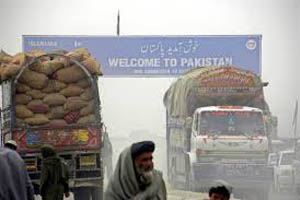
Cross stuffing of Afghan, Uzbek cargo allowed at Karachi Port
A notification regarding allowing of cross stuffing was issued by the Directorate General of Transit Trade a couple of days earlier, due to the restriction placed on cross stuffing, the businessmen were facing extra charges due to delays in the return of containers to the shipping company. The containers carrying goods took several days in reaching to Afghanistan and returning back to Karachi port, inflicting huge fines on importers under the head of detention charges. With allowing of cross stuffing, the containers will be offloaded at Karachi and goods be transferred to trucks for onward transportation to Afghanistan. Director Pak-Afghan Joint Chamber of Commerce and Industry (PAJCCI) has welcomed permission from the customs department for cross stuffing of Afghan and Uzbek cargo at Karachi Port. In a press statement issued he said it was a welcome step that the demand of businessmen dealing in Pak-Afghan trade had been met. Director PAJCCI also urged that GD (Goods Documentation) filing at Aza Khel dry Port in Nowshera district. This decision will not only reduce the burden on Karachi port, but would help in making Aza Khel dry port operational, besides creating employment opportunities in Khyber Pakhtunkhwa by providing livelihood to more than 270 custom clearing agents.
|

Setting up of big refinery in Balochistan: proposals sought
The Board of Investment (BoI) has sought responses from involved Ministries to queries posed by a consortium planning to build a 10-million-tonne-per-year (MTPA) refinery in Balochistan. Capital Strategies Group (Pvt.) Ltd (CSG) is a prominent trading firm headquartered in Pakistan. The company is one of the leading organisations in the country, representing global corporations in the energy, infrastructure, vertical transportation, cement, fertilizers, and defence industries. CSG and a Chinese consortium are working together to build a 10 million MTPA refinery in Pakistan. To complete the project outline, the organisation required more data and information. BoI, in its letter to the Petroleum Division, Power Division, Federal Board of Revenue (FBR), and Ministry of Industries and Production (MoI&P) has requested additional information so that the company is facilitated to invest in the establishment of the refinery
|

China asked to speed up work on ML-1, KCR
Pakistan on 10th April, asked China to expedite the process for implementation of the first phase of $10 billion Mainline-1 (ML-1) — the 1,872km railway track along with associated facilities from Karachi to Peshawar — and $2bn Karachi Circular Railway (KCR) as agreed between the leadership of the two nations in November. Pakistan “requested strong support of National Development and Reforms Commission (NDRC) and other relevant Chinese government institutions to advance implementation of important projects like ML-1, KCR and key energy projects in line with the leadership consensus,” said a statement issued by the ministry of planning and development after a bilateral meeting on China-Pakistan Economic Corridor (CPEC).
|
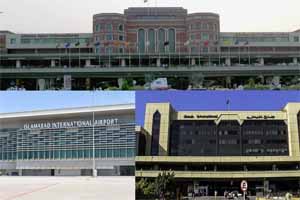
IFC team starts the process to evaluate outsourcing of Karachi, Lahore and Islamabad airports
A team of the International Finance Corporation has reached Pakistan to evaluate the outsourcing of Karachi, Lahore, and Islamabad airports. The IFC team members are holding meetings with the senior CAA officials and others to kickstart work on the process of the three airports’ outsourcing. The experts of the IFC also held meetings with the representatives of the international airlines Emirates, Saudi Airlines, and Pakistan International Airlines and discussed with them the matters pertaining to the outsourcing. Meanwhile, the cabinet has approved the draft Transaction Advisory Agreement with the IFC to outsource Pakistan’s three major airports. Importantly, Pakistan government has hired the IFC to outsource the three airports. The officials of the IFC would continue their meetings with different stakeholders in Pakistan till April 14. At present, 44 countries in the world, including the United States, UK, India, Bahrain and Brazil are running their airports in the public-private partnership.
|

Remittances hit 7-month high at $2.5b
Overseas Pakistanis sent home a record-breaking $2.53 billion in remittances in March, giving the country hope for a future current account surplus. The State Bank of Pakistan (SBP) announced that the inflows of workers’ remittances increased by 27.4% compared to the prior month of February 2023. The sharp rise in remittances can be attributed to two main factors, Firstly, the ongoing holy month of Ramzan has led non-resident Pakistanis to send higher funds to their family members, to cope with the high food prices during this period. Secondly, the significant depreciation in the rupee against the US dollar in recent months has encouraged a greater number of overseas Pakistanis to send their funds through official channels like banks and exchange companies, instead of through illegal hawala-hundi operators.
|

Govt renews E&P licence to boost output
The government has renewed the exploration licence of a Polish energy firm for the second time in a bid to boost oil and gas production in the country. It has also approved exemption from the condition of relinquishing 10% of licence area at the end of first licence renewal. So far, the polish company has failed to kick off hydrocarbon exploration to meet the country’s growing energy demand. The government approved the renewal and granted exemption after the company approached it at the end of first renewal. It is part of the government’s policy that oil and gas exploration and production (E&P) companies would have to relinquish 10% of licence area if they fail to begin exploration by the end of first renewal. However, it exempted the Polish firm from the condition keeping in view the fact that the country was facing an oil and gas crisis and companies were even barred from opening Letters of Credit (LCs) for oil imports owing to the shortage of dollars.
|
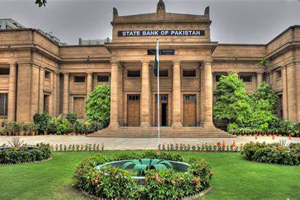
SBP hikes interest rate to 21pc to tame inflation
The State Bank of Pakistan on April 4th, increased its key interest rate to a record 21 percent in an effort to contain the spiralling inflation amid the International Monetary Fund’s programme hanging in balance. The central bank’s Monetary Policy Committee (MPC) raised the policy rate by 100 basis points (bps). Though the move somewhat matched market and analyst forecasts, the majority of respondents in different surveys carried out by brokerage firms anticipated a big 200 bps rate increase by the SBP. The SBP increased the policy rate to 21 percent and the discount rate to 22 percent. This is the highest-ever policy rate since it started in 2015. Similarly, the discount rate reached the highest since the start in the early 1990s. The Monetary Policy Committee said in a statement that it expected inflation to remain high in the near term. “However, there are early indications of inflation expectations plateauing, albeit at an elevated level,” it said. “The MPC views the decision as an important step towards anchoring inflation expectations around the medium-term target, which is critical for achieving the objective of price stability,” it said and added that Pakistan’s financial sector remained broadly resilient, while economic activity continued to moderate. In its March meeting, the SBP raised the cost of borrowing by 300 bps to 20 percent and projected the average inflation rate for the current fiscal year in the range of 27-29 percent, up from its previous forecast of 21 to 23 percent. Since then, the fresh data has shown that the consumer price index inflation soared to an all-time high of 35.4 percent in March as food and energy prices spiraled. The SBP acknowledged that the current account deficit had narrowed considerably, more than previously anticipated, mainly on the back of sizable import containment. Nonetheless, the overall balance of payments position continues to remain under stress, with foreign exchange reserves still at low levels, it warned.
|
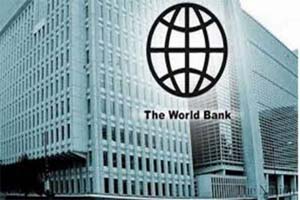
WB, ADB cut Pakistan GDP forecast to below 1pc
Projecting a massive decline in GDP growth to 0.4 percent, the World Bank (WB) warns that the non-completion of IMF programme, failure to secure financing from key bilateral partners and political instability may result in eruption of a major macroeconomic crisis. While the Asian Development Bank (ADB), in a separate report, projects a significantly lower GDP growth rate of 0.6 percent, ballooning inflation of up to 27.5 percent and an ongoing foreign exchange crisis in Pakistan. In Pakistan Development Outlook released here, the WB says: “The country’s outlook is subject to major downside risks, which, if they materialise, could result in a macroeconomic crisis. The non-completion of the IMF programme and failure to secure expected rollovers, refinancing, and new financing from key bilateral partners presents major risks.” According to the WB report, approximately four million people fell below the poverty line as poverty increased by one percentage point in Pakistan during the last year. The poverty measured at the lower middle-income poverty line (3.65 USD/day 2017 PPP per capita) is projected to increase to 37.2 percent in FY23 against 36.2 percent in FY22 pushing an additional 3.9 million people into poverty as compared to FY22.
|

Thousands of jobs at stake as phone makers in Pakistan close shop
Almost all of the country’s 30 mobile phone assembly units, including three run by foreign brands, have shut down as manufacturers say they have run out of raw material amid import restrictions, putting the future of some 20,000 employees at stake. Most companies have furloughed employees after paying them half of their April salaries in advance. They have been told that they will be called back as soon as production resumes. The Pakistan Mobile Phone Manufacturers Association (PMPMA) informed the IT ministry in a recent letter that the local mobile supply had almost stopped and the markets had also started to face mobile phone shortages.
|
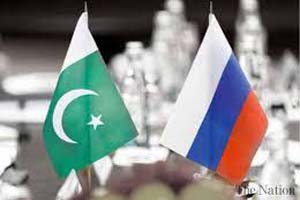
Pakistan to place order for Russian oil next month: minister
Minister of State for Petroleum has said that the government will place its first order for Russian crude next month and it would take about four weeks for the commodity to reach Pakistan. Malik had flown to Moscow for talks on issues including oil and gas supplies after which the government announced that it would purchase discounted crude oil, petrol, and diesel from Russia. In January 2023, a Russian delegation arrived in Islamabad for talks to finalise the deal. During the three-day meeting, the countries decided to address all technical issues — insurance, transportation and payment mechanism — to sign an agreement by late March this year. “After consensus on the technical specifications achieved, the oil and gas trade transaction will be structured in a way it has a mutual economic benefit for both countries,” a joint statement issued by the two sides had then stated. Malik said that a number of agreements with Russia had been reached and Pakistan will place an order next month. “However, it will take some time for the oil to reach Pakistan nearly 26 to 27 days,” he stated, revealing that the commodity will arrive in the country via sea. Malik also clarified that Russia had assured the government that it was giving Pakistan a discount as much as any other neighbouring country was receiving.
|
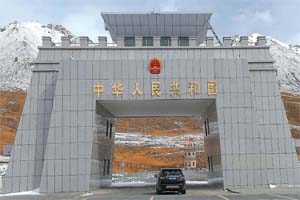
Khunjerab Pass opened for Pakistan-China trade after three years
The Khunjerab Pass, a major trade route between Pakistan and China, has been reopened after a closure of almost three years due to the Covid-19 pandemic. The pass connects Gilgit-Baltistan with China’s Xinjiang Uyghur Autonomous region and was closed in 2020 following the outbreak of Covid-19. According to official sources, Chinese authorities have shared a letter with Pakistani officials regarding the reopening of the pass for trade, and port authorities on the Chinese side have been instructed to take all necessary measures to contain Covid-19 before the arrival of goods from Pakistan. Similarly, Pakistani border authorities have also been instructed to take all measures regarding Covid-19, ensuring the containment of the disease. Khunjerab Pass generally opens from April 1 to November 30 every year, and remains closed from December 1 to March 31 due to cold weather and lack of oxygen in the high altitude. But to ensure the smooth customs clearance of Pakistan’s urgently-needed and other supplies, the port was temporarily opened twice early this year. Despite difficulties including extremely cold weather, heavy snow and lack of oxygen, the local customs have worked round the clock to ensure the transportation of cargo. This year, the last temporary opening lasted for 12 days between January 30 and February 10 while the first port opening was between January 19 and 20. The two temporary openings facilitated 128 cross-border personnel visits, 328 transportation vehicles’ passes, and more than 6,000 tonnes of goods exported. The reopening of the border crossing is expected to boost economic activities between the two countries.
|
|

© 2023 Alpine Marine Services Private Limited
all rights reserved
|
|
|